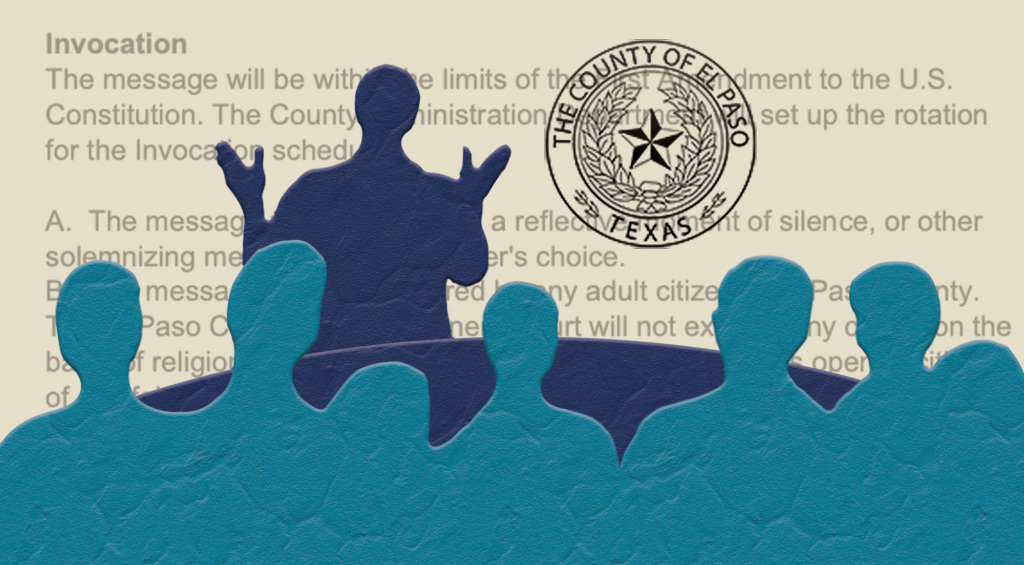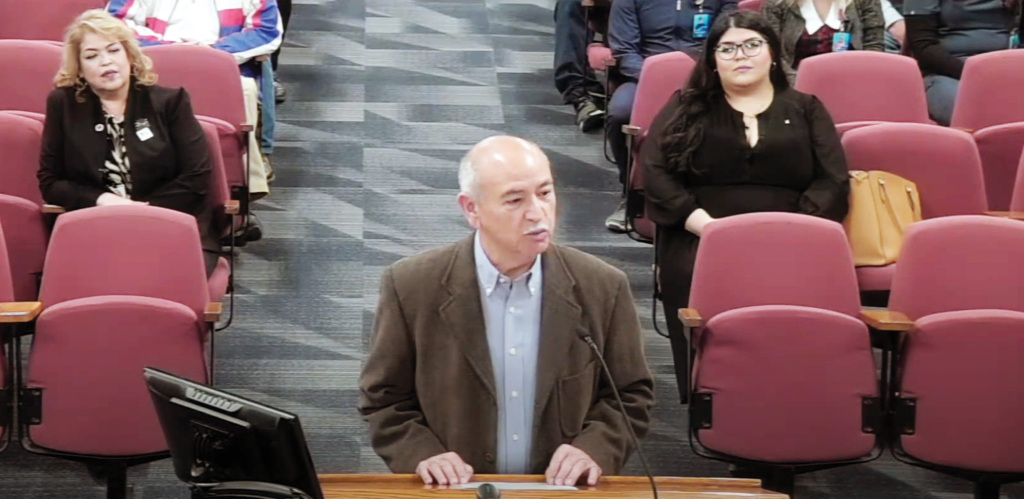
After our local county government ruled to allow public prayer at meetings, the first question we advocates of separation of church and state had was, “Now what?”
As an activist group, Join us for Justice, the El Paso, Texas, Chapter of Americans United, is charged with addressing local violations of religious freedom. This extends to the weekly public meetings of the El Paso City Council and the El Paso County Commissioners Court that routinely open with a public prayer or “invocation.” Some of the invocations have become exclusionary and preachy.
Nevertheless, we decided to welcome the public prayer ritual, and here’s why.
It’s 9:30 a.m. on Monday, and residents from the El Paso community have gathered at the courthouse to speak in an open forum at the County Commissioners Court. (In this context, “court” refers to a legislative body, not a judicial one.) Several schoolchildren lead us in the Pledge of Alliance to the American flag followed by a shorter pledge to the Texas flag. The children are in their classroom, and we see them on the video screen at the front of the room. By tomorrow morning, the complete broadcast will be available to the public on YouTube, where it will reside indefinitely.
A woman’s voice floats over the sound system, asking everyone to “Please be seated for an invocation delivered today by Joe Nevarez, a representative of Join us for Justice, the El Paso Chapter of Americans United for Separation of Church and State.” Those same words appear as a banner at the top of the screen.
The four commissioners sit on either side of County Judge Ricardo Samaniego, a charming and affable statesman, who graciously welcomes Joe.
Prayers at government meetings go against the principle of separation of church and state. Yet, in 2014, the Supreme Court held that the town of Greece, N.Y., was not violating the U.S. Constitution by opening its public meetings with a prayer — even if they were often Christian. But the high court also held that government officials should strive for diversity and respect other viewpoints.
That created an opening for secular invocations, and shortly after the Greece v. Galloway decision came down, Join Us for Justice delivered what might have been the first such secular invocation in Texas before a meeting of the El Paso City Council.

Offering an opening message: Joe Nevarez provides some thoughts in El Paso
In 2016, we also fought against invocations at the county level. We fought hard and managed to get invocations off the table – for a while.
But when a new round of commissioners was elected to the court in the spring of 2019, the issue resurfaced. This time, it seemed that the decision was pre-ordained, and a policy for offering invocations was installed.
Just prior to the vote, and in opposition to his colleagues on the court and many of his constituents who were in the room on that day to speak in support the measure, Commissioner David Stout took a few minutes to make some eloquent remarks in opposition to the proposal.
“I am worried about this being exclusionary or discriminatory,” Stout said. “I heard a number of the folks that came up and spoke —and I thank you all for coming and speaking — saying things like: ‘We should all acknowledge God,’ ‘Seek Divine Guidance,’ ‘Realize who God is.’ Those sound like very Christian statements and not everybody who lives in this community and who come to these meetings have to deal with the county on a daily basis. And not everyone is Christian. I am. I’m a Catholic. I believe in the power of prayers, and I know that it works wonders.
“But at the same time, I know that there is a fifth of the population in this country that is not even religious, and I just feel that we would be excluding one-fifth of the population here if we decide to implement something like this. And I understand that it is non-denominational, but even the word ‘non-denominational’ implies religion, and there are people who are not [religious] and I think we need to keep that in mind. Understand that even though some of us are religious and have different faiths, we can’t in my opinion, be in a public place where our salaries are paid by taxpayer money. All taxpayers have their right to have a public meeting that is not exclusionary.”
Stout added that he would be happy to pray privately with other members of the court before the meeting.
Alas, Commissioner Stout was the sole dissenting vote.
Judge Samaniego implied that the outcome of the vote was inevitable. “Because we use ‘God’ in the Pledge of Allegiance, it’s difficult not to offer an invocation,” he said. But he emphasized, “We still have to make sure that it’s inclusive to everyone.”
After losing that vote, we determined to do our best to set an example by giving invocations that are inclusive of people of all faiths, as well as those who are non-believers. At first, we struggled to find words that do not invoke a deity. In crafting their messages, some members inadvertently ended with an “Amen.”
We also noticed that once the policy was enacted, some members of the clergy offered impassioned messages that have become increasingly divisive and exclusionary over time, with a disturbing Christian slant. These comments would be OK for a church — they’re not for government meetings.
But we concluded that if the church can preach, we can teach. In his message on October 19, 2023, David Marcus, our organization’s president, clarified before the commissioners that our organization no longer uses the term “invocation.”
He explained that invocation “infers a religious message. Offering to give a ‘secular invocation’ is impossible; it’s a combination of contradictory words — an oxymoron.”
From then on, what we previously called “invocations,” we now refer to as “opening messages.” This is a powerful and helpful distinction. Veering from the task of devising redundant and formulaic messages, we now view our time before the commissioners and the public (and available supposedly forever on YouTube) as an opportunity to speak about the compelling issues of the day while never referencing politics or taking any political stance.
Joe Nevarez and others in our group feel more comfortable delivering an opening message than an invocation. We have come to welcome the invocation policy because it works in our favor. It gives more of our members a way to get involved as activists; our faces and our organization are front and center twice each month as we demonstrate that there is an alternative to religious prayer. And we are free to compose our own messages, making sure to steer away from partisan politics as well as partisan religion.
Our approach has a very grassroots feel to it, and we adapt as need be. In August of 2019, El Paso was left reeling from a mass shooting at a local Walmart in which a lone shooter targeted random people because of their race, killing 23.
Our community came together, bonded by our collective grief. Two weeks after the shooting, I delivered the opening message by reciting the words to John Lennon’s “Imagine” in their entirety, in which his beautiful and powerful message yearns for a world in which “all people live as one.”
Ensuring that government at all levels respects and honors the diversity of the people it serves is the first step to achieving Lennon’s optimistic vision.


